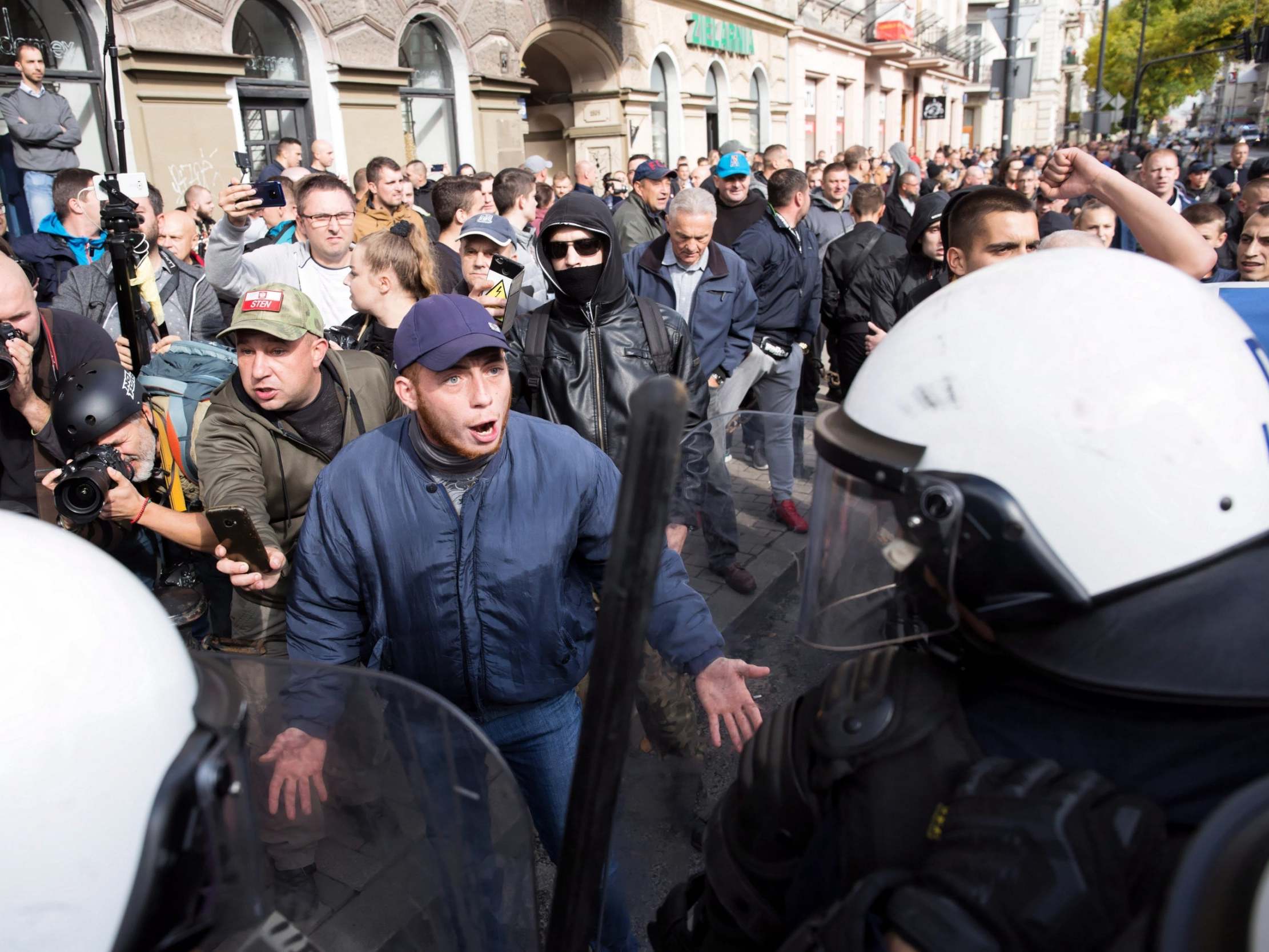Police fire tear gas and arrest dozens of far-right protesters attempting to disrupt LGBT+ march
Polish government accused of weaponising anti-LGBT sentiment as key issue in upcoming election

Your support helps us to tell the story
From reproductive rights to climate change to Big Tech, The Independent is on the ground when the story is developing. Whether it's investigating the financials of Elon Musk's pro-Trump PAC or producing our latest documentary, 'The A Word', which shines a light on the American women fighting for reproductive rights, we know how important it is to parse out the facts from the messaging.
At such a critical moment in US history, we need reporters on the ground. Your donation allows us to keep sending journalists to speak to both sides of the story.
The Independent is trusted by Americans across the entire political spectrum. And unlike many other quality news outlets, we choose not to lock Americans out of our reporting and analysis with paywalls. We believe quality journalism should be available to everyone, paid for by those who can afford it.
Your support makes all the difference.Riot police have tear gassed and arrested dozens of far-right protesters after hundreds tried and failed to disrupt an LGBT+ parade in Poland.
Nearly 30 people have been detained so far after an estimated 200 counter-demonstrators attempted to block the route of the Lublin’s second ever march for gay rights.
Balaclava-clad homophobes brandished banners likening homosexuality to paedophilia and reading “woe to him who rots in silence”, attempting to pelt marchers with eggs, local media reported.
Shielded by a wall of riot police, who held the antagonists at bay with water cannons, rainbow-adorned Pride marchers carrying signs promoting tolerance and personal freedom were able to safely conclude the parade as planned without any disruption.
The ruling Law and Justice party (PiS) has increasingly sought to stoke anti-LGBT+ sentiment in the devoutly Catholic nation, painting “LGBT ideology” as an affront to traditional Polish values.
The prime minister’s adviser Jaroslaw Kaczynski has publicly urged citizens to resist the “travelling theatre” of Pride marches which he described as “a real threat to ... the Polish state”.
Around 30 cities and localities have declared themselves “LGBT-free zones” this year, with one conservative newspaper distributing stickers printed with the phrase.
In Lublin, government representative Przemysław Czarnek reportedly handed medals to local politicians who voted in favour of declaring their localities “LGBT-free”, The Washington Post reported in July.
Despite warnings from campaigners that the government’s weaponisation of the issue could fuel hate crimes, PiS has made its opposition to “LGBT ideology” a key issue in its campaign ahead of parliamentary elections on 13 October.
Party officials have previously claimed they are not against gay couples, but just want them to exist solely in private.
“Scaremongering about ‘LGBT ideology’ has almost become official policy in Poland with often nasty insinuations from members of the government and public media now the norm,” said Stanley Bill, a University of Cambridge lecturer in Polish culture and politics said.
Speaking to The Washington Post, Poland’s independent commissioner for human rights described PiS officials’ remarks as “on the margins of hate speech … the government is increasing homophobic sentiments”.
As in other central and eastern European countries, the LGBT+ community has become more vocal in recent years, with record numbers of Pride marches, some held in small conservative towns.
The 2018 Pride march in Lublin, the first in the city’s history, saw a similar far-right presence and threat of violence. In July, Bialystok’s first parade attracted roughly 4,000 protesters, with some throwing rocks, glass bottles and firecrackers, kicking and punching participants.
On Saturday, police from across the region were called in to oversee the event, which the city’s mayor had tried to shut down on safety grounds before being overruled by the Court of Appeal.
Despite the heavy far-right presence and attempts at intimidation, police said no protesters were harmed. Some antagonists were sprayed with coloured liquid, so officers could more easily identify them.
“The entire march was documented,” Lublin Police said in a statement. “All recordings from police cameras and materials from city monitoring will be used to identify more people who have violated the law.”
Organiser Bartosz Staszewki said: “We’ve had death threats, [this violence] was about forcing us not to have this march.”
Agencies contributed to this report
Join our commenting forum
Join thought-provoking conversations, follow other Independent readers and see their replies
Comments